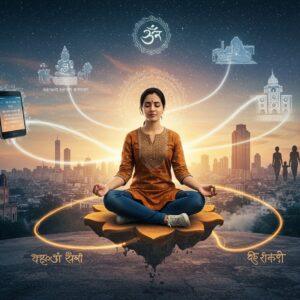
The Anguttara Nikaya, a crucial Buddhist scripture, holds significant importance for UPSC aspirants. This text offers valuable insights into Buddhist philosophy, a vital component of India’s cultural and historical landscape. This blog post delves into how the Anguttara Nikaya can aid in UPSC exam preparation.
Understanding the Anguttara Nikaya
As one of the five Nikayas within the Sutta Pitaka of the Pali Canon, the Anguttara Nikaya is recognized for its unique numerical organization. This structure, grouping teachings by numerical themes from one to eleven, facilitates memorization and systematic comprehension of key Buddhist concepts and practices. This systematic approach is particularly helpful for UPSC studies, especially in areas like Indian philosophy and religious studies, as these topics often appear in the UPSC syllabus.
Why Buddhist Philosophy Matters for the UPSC Exam
Buddhist philosophy is integral to India’s cultural and historical narrative, making it a relevant area of study for the UPSC exam. The Anguttara Nikaya provides valuable insights into ethical conduct, mental discipline, and wisdom, elucidating the moral and philosophical foundations of Indian society. Moreover, the emphasis on mindfulness and meditation can be practically applied to manage stress and enhance focus—essential skills for navigating the demanding UPSC preparation process.
Key Teachings and Their UPSC Relevance
The Anguttara Nikaya is a rich source of teachings directly applicable to UPSC exam topics. Key concepts include:
- The Four Noble Truths: Understanding the nature of suffering, its origin, its cessation, and the path to its cessation is crucial for grasping the essence of Buddhist thought.
- The Noble Eightfold Path: This practical framework for ethical living and mental discipline can be applied to the Ethics paper of the UPSC exam, offering a structured approach to answering questions on moral conduct.
- Anatta (Non-Self): This concept is vital for understanding Buddhist metaphysics and can be valuable when addressing questions related to Indian philosophy in the UPSC exam.
Utilizing Anguttara Nikaya Quotes in the UPSC Exam
Incorporating relevant quotes from the Anguttara Nikaya can enrich your answers and demonstrate a deeper understanding of Buddhist philosophy. Consider these examples:
- “Hatred does not cease by hatred, but only by love; this is the eternal rule.” (Anguttara Nikaya 1.5) – This quote can be used in essays or ethics papers to discuss non-violence.
- “Mind is the forerunner of all actions.” (Anguttara Nikaya 1.6) – This quote emphasizes the importance of mental discipline and can be relevant in discussions on ethics and self-control.
Practical Applications for Exam Preparation
Beyond theoretical knowledge, the Anguttara Nikaya offers practical tools for exam preparation. The teachings on mindfulness and meditation can help manage stress and improve focus during long study sessions. Cultivating “right effort,” a component of the Noble Eightfold Path, promotes consistent and diligent study habits. Furthermore, the emphasis on ethical conduct encourages aspirants to maintain integrity and fairness, qualities essential for future civil servants.
Connecting with Buddhist Traditions through Poojn.in
For those seeking to deepen their understanding of Buddhist practices and history, Poojn.in offers a wide selection of relevant products. Enhance your study environment and connect with the rich traditions of Buddhism through authentic ritual items and cultural goods available on Poojn.in.
Explore resources such as:
- Incense sticks: Create a serene atmosphere conducive to focused study.
- Red sandalwood malas: A tangible connection to Buddhist practices.
- Pure camphor: Used in traditional ceremonies and purification rituals.
Conclusion
The Anguttara Nikaya provides valuable wisdom for UPSC exam preparation. Its teachings on ethics, mental discipline, and wisdom offer insights into Indian philosophy and cultural history, enabling a deeper understanding of these crucial subjects. By integrating these teachings into your study routine, you can enhance your knowledge, improve exam performance, and cultivate essential qualities for a successful career in civil services.
Explore further resources on Buddhism and Indian culture on Hindu Philosophy and Connecting with Your Inner Self at Poojn.in.


